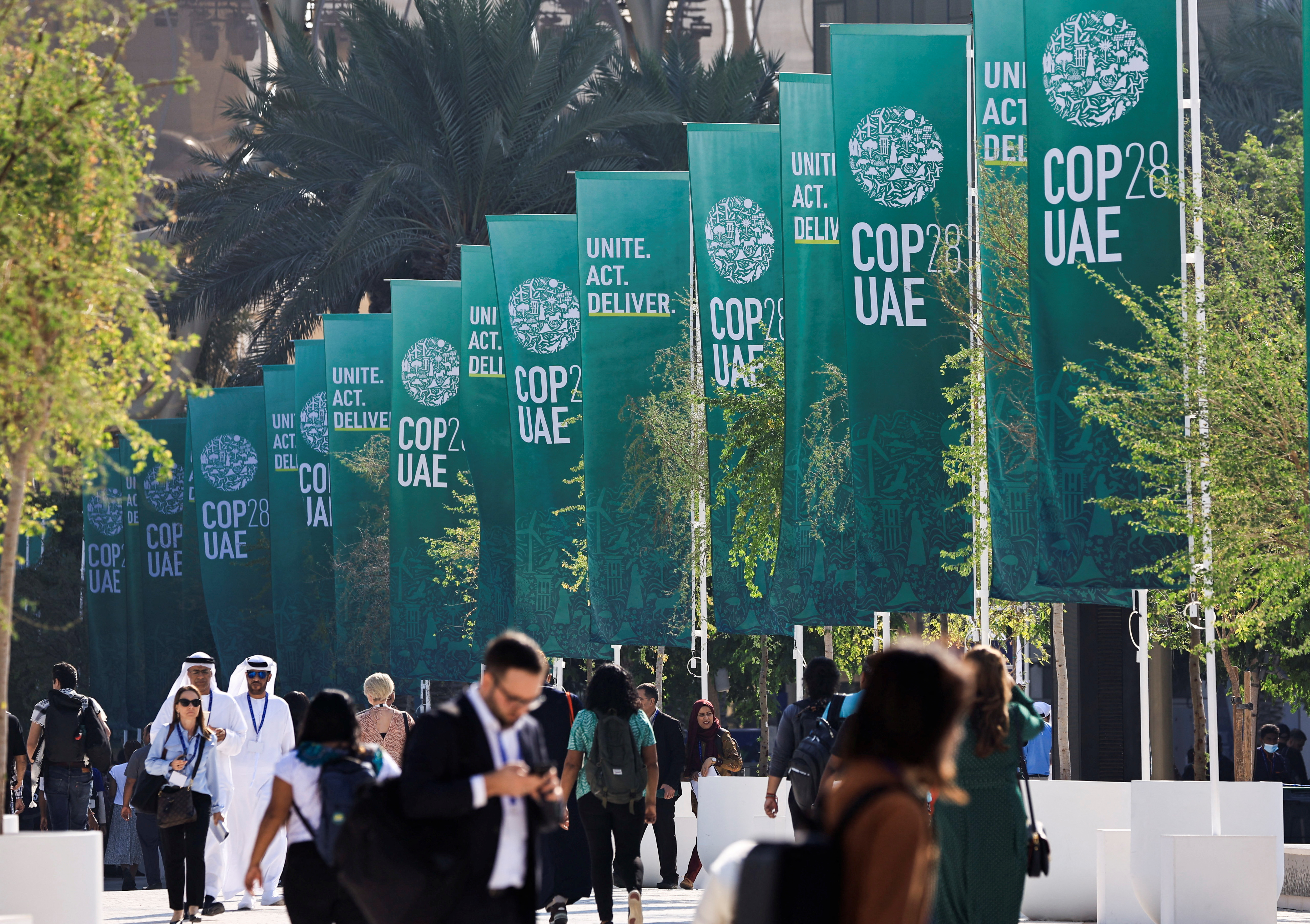DUBAI, Dec 9 (Reuters) – Some countries are resisting a proposed pledge to phase-out fossil fuels in a COP28 climate deal, jeopardising attempts for U.N. climate talks to deliver a hard commitment for the first time in 30 years on ending the use of oil and gas.
Observers in the negotiations said Saudi Arabia and Russia were among countries insisting that the summit in Dubai focus only on reducing climate pollution – with no mention of the fossil fuels causing it.
Earlier this week, the oil producer group OPEC sent a letter urging its members and allies to reject any mention of fossil fuels in the final summit deal. The letter warned that “undue and disproportionate pressure against fossil fuels may reach a tipping point” in the talks.
In a statement to Reuters, OPEC Secretary General Haitham Al Ghais declined to comment on the letter, but said OPEC wanted to keep the summit’s focus on reducing climate-warming emissions, and away from their main sources like oil and gas.
“The world requires major investments in all energies, including hydrocarbons,” he said. “Energy transitions must be just, fair and inclusive.”
It was the first time OPEC’s Secretariat has intervened in the U.N. climate talks with such a letter.
“It indicates a whiff of panic,” said Alden Meyer of think-tank E3G.
Saudi Arabia is the top producer in OPEC and the de facto leader of the organization. Russia is a member of the so-called OPEC+ group.
By insisting on focusing on emissions rather than fossil fuels, the two countries appeared to be leaning on the promise of expensive carbon capture technology, which the U.N. climate science panel says cannot take the place of reducing fossil fuel use worldwide.
On the other side, at least 80 countries including the United States, European Union and many poor, climate-vulnerable nations are demanding that a COP28 deal call clearly for an eventual end to fossil fuel use.
Other countries including India and China have not explicitly endorsed a fossil fuel phase-out at COP28, but have backed a popular call for boosting renewable energy.
Ireland’s former president, Mary Robinson, who heads a group of former world leaders known as the Elders, said the letter showed OPEC was “worried” about the trajectory of the COP28 talks.
“Russia and Saudi Arabia are on the wrong side of this and will probably be pushing hard,” Robinson said. “We really have to make sure that the tipping point tips the right way.”
Diplomatic grievances were also aired at the podium on Saturday.
A Russia representative said in a speech that Moscow was looking into whether some of the roughly $300 billion in gold reserves frozen by the West after Russia invaded Ukraine could be used for a climate damage fund for developing countries.
Meanwhile, China complained about what it said was unacceptable talk about Taiwan’s participation in the talks. And a Palestinian representative denounced Israel’s war in Gaza, saying the conflict made it difficult to focus on climate change efforts.
‘CRITICAL STAGE’
With the summit’s scheduled to end on Tuesday, government ministers from the nearly 200 countries at the Dubai summit have joined in trying to resolve the fossil fuel impasse.
Climate-vulnerable countries said a rejection of a fossil fuel mention at COP28 would threaten the entire world.
“Nothing puts the prosperity and future of all people on earth, including all of the citizens of OPEC countries, at greater risk than fossil fuels,” said Marshall Islands climate envoy Tina Stege in a statement.
The Marshall Islands, which faces inundation from climate-driven sea level rise, currently chairs the High Ambition Coalition group of nations pushing for stronger emissions-cutting targets and policies.
To meet the global goal of holding climate warming to within 1.5 degrees Celsius above preindustrial temperatures, the coalition “is pushing for a phase out of fossil fuels, which are at the root of this crisis,” she said. “1.5 is not negotiable, and that means an end to fossil fuels.”
The latest version of the negotiating text, released Friday, shows countries were still considering a range of options – from agreeing to a “phase out of fossil fuels in line with best available science”, to phasing out “unabated fossil fuels”, to including no mention at all.
Germany’s climate envoy Jennifer Morgan said counties were “moving into the critical stage of negotiations”.
“It is time for all countries to remember what is at stake,” she said. “I am concerned that not all are constructively engaging.”
Asked about the OPEC letter, COP28 Director General Majid Al Suwaidi avoided the term “fossil fuels” but said the United Arab Emirates, as president of the summit, wanted a deal to get the world on track to limit warming to 1.5 C.
“Our COP president … clearly wants to see an outcome that is as ambitious as possible, and we believe we are going to deliver it,” he told a news conference.
Speaking on behalf of the Alliance of Small Island States, Samoa’s environment minister, Cedric Schuster, worried that this year’s talks were getting bogged down by disputes.
“We are extremely concerned about the pace of negotiations given the limited time we have left here in Dubai,” he told the summit from the main stage on Saturday.
“A target for renewables cannot be a substitute for a stronger commitment to fossil fuel phase-out and an end to fossil fuel subsidies,” he said. “COP28 needs to deliver both.”
Azerbaijan looks set to host next year’s COP29 climate change summit after winning backing from other Eastern European nations, unblocking a geopolitical deadlock over the next global gathering to address climate change.
Share This:




 CDN NEWS |
CDN NEWS |  US NEWS
US NEWS 





























COMMENTARY: Markets Call Trump’s Bluff on Russian Oil Sanctions in Increasingly Risky Game – Bousso